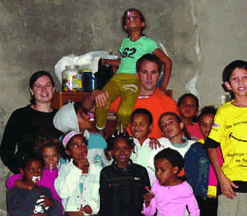Combining Agiculture and Foreign Cultures
By: Haley A.White

When Sara Johnson received her bachelor's degree in biosystems engineering from Auburn University in May, she graduated with more than just a diploma. During her undergraduate years at Auburn, Johnson sought and took advantage of opportunities to travel abroad and study foreign cultures. In September 2001, Johnson traveled to Morocco, where she studied Arabic for seven months at the American Language Institute in Fez, and then spent three months in Casablanca and Spain. When she returned to Auburn in June 2002, Johnson felt she had successfully achieved her goal of experiencing Morocco from a non-tourist perspective as much as possible. She studied the language and the culture by living with a Moroccan family, traveled to different areas and found possible ways to put her biosystems engineering degree into action.
Biosystems engineering is a unique department at Auburn. Students enroll in the Samuel Ginn College of Engineering, but the deans of engineering and agriculture jointly supervise the program.
Because of that, Johnson was eligible to apply for funding for her travel both through Birdsong Engineering, a study-abroad scholarship in the College of Engineering, and through AU International, a scholarship available through the College of Agriculture. With the funding secured, she began to plan and organize the trip on her own.
During her visit to Morocco she encountered many experiences that allowed her to explore the application of her studies in biosystems engineering.
A two-week study had been planned that would have given Johnson a chance to look at small and large-scale agriculture in different parts of the country.
However, in the wake of the Sept. 11 attacks, the trip was cancelled. Finally, near the end of her time in Morocco, Johnson got the opportunity to travel with agriculture students of a Moroccan school on a short two-day field trip.
Johnson and the group visited an area in northern Morocco where a watershed was polluting public water with silt and soil. The group explored the site and sought out ways through research and conservation to improve the water quality for the residents of the city.
"Overall it was successful," Johnson says of her trip to Morocco. "The last two days I really got to do what I wanted, but I also did a lot of things I hadn't planned on doing, which was even more beneficial."
This year Johnson decided to extend her desire for international study to Brazil. From June 11 to July 3 she traveled and worked in several areas of Brazil such as Ouro Preto, Aracuaí, Belo Horizonte, Agua Limpa and Malhada Branca.
In contrast to her solo trip to Morocco, Johnson traveled to Brazil with an organization called Christian Children's Fund (CCF) and was accompanied by biosystems engineering major Matt Webster, Bryan Duncan, professor of fisheries, and Kyung Yoo, professor of biosystems engineering.
CCF is an organization that allows people all over the world to sponsor a child by donating money to his or her well-being. The money then provides services for the children in their home communities ranging from clean water, basic hygiene instruction and education.
Johnson's goals for this trip were to gain hands-on experience with the Brazilian people and to provide them with a service to better their quality of life, which she says is not easily accomplished without first gaining the trust of the citizens.
"When you go into a community you can't just say ‘Oh we're putting a dam here and you're going to have water.' You have to have agreement on all sides and organization on a community level," Johnson says.
This part of Brazil has a dry and a wet season. Toward the end of the dry season, water can become scarce. Many families' children leave home to search for water during the day, missing school and being forced to walk long distances.
Johnson and her group researched a couple of different methods to provide safer water to the communities.
One method is a roof catchment system that allows a roof-mounted gutter to catch rainwater and store it in a tank. Another method is building a dam to store water during the wet season until it is needed during the dry season.
Johnson and the team used equipment such a Global Positioning System (GPS) and a contour gun to design maps of the communities that include useful information such as elevations and slopes.
Johnson and Webster also gathered general demographic information, such as the number of children and adults in each home and which homes already had a roof catchment system.
"The main reason I chose to study abroad is because I have a desire to learn about people from other cultures and what makes them the way they are and what moves them," Johnson says.
Differences between the Moroccan and Brazilian cultures made both trips memorable and unique for Johnson.
The hardest thing, she says, was getting used to the strict manner in which women in Morocco were regarded as opposed to women in Brazil. However, she says both countries were very hospitable.
Throughout her travels, Johnson has learned a great deal about people and cultures and science. And she even has come to some conclusions about global relations.
A professor once asked Johnson why terrorism even exists. Recalling her own first-hand experiences, she responded by saying, "Wherever a need exists, there will always be a want; there will always be anger and resentment until that need is met."
